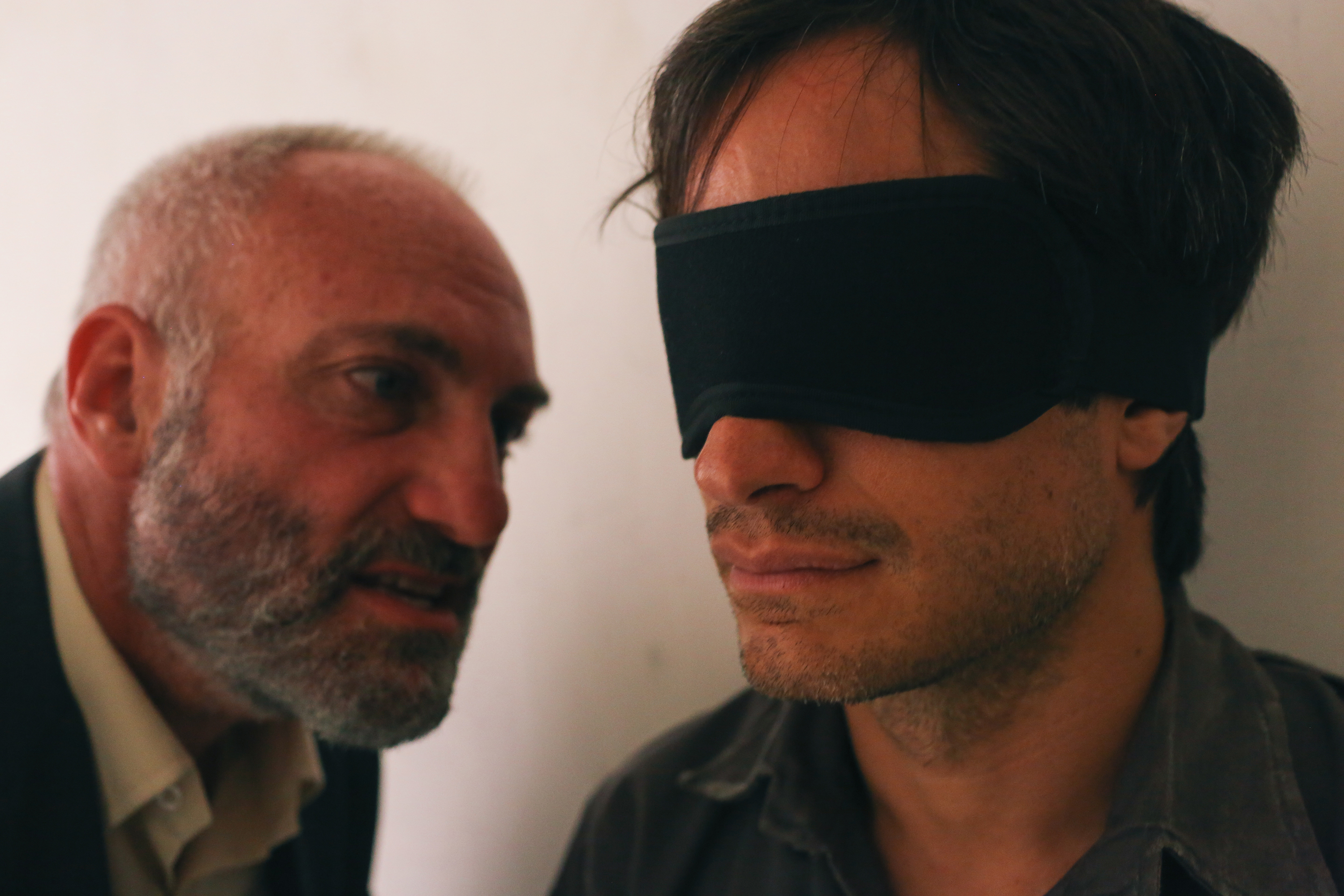The Better Angels
Opens Fri., Nov. 14 at Varsity. rated PG. 94 minutes.
Lincoln and the log cabin—such is the foundational mythology of 19th-century politics that you can forget how, yes, our 16th and greatest president actually grew up barefoot and poor in frontier conditions that would now be described as Third World. No water but the stream (possibly flowing with typhoid fever), no doctors, no books but the Bible; famine, disease, and howling wolves right outside your door (if you had a door). Kids today complain about spotty Wi-Fi connections and gluten allergies, while the 8-year-old Abe (Braydon Denney) soon suffers the loss of his mother (Brit Marling) and has to survive a harsh Indiana winter while stranded with his young sister and teenage cousin. His father (Jason Clarke) has gone east to find work, maybe, and the kids cower in the cold by the hearth, eating moldy corn they’ve mashed into gruel. Close to starving, here is the future statesman who’ll 40 years later save the union. In 1817, that prospect hardly seems likely.
Filming in muted black-and-white, A.J. Edwards based his coming-of-age tale on period interviews with those who knew Lincoln in his day. It’s not a Greatest Man biopic like those crafted by Steven Spielberg or John Ford; the focus here is on the primal seasons and influences that shape this mostly silent, passive child. His mother is illiterate, loving, and deeply spiritual. His father is a strong, practical woodsman not given to praise. Young Abe sees death up close, meets untamed Indians, and encounters a shackled slave gang. His life experiences are, by today’s broadband standards, incredibly narrow. Yet those, the film implies, are all he will need to lead us.
Edwards’ own name on this somber, worthwhile debut is much smaller than that of his producer, Terrence Malick, for whom he’s worked on past projects (and who initiated this one). The influence is inescapable: long voiceover passages, long silences, characters wandering in the grass, bare trees grasping at the sky, passages of classical music, a woozy sense of plot or momentum, and a God’s-eye view of human foibles. There is humanity here, but it’s studied and seldom passionate. When Abe’s family is blended to include new siblings and mother (Diane Kruger), the notion of reconciliation is implanted with grave, deliberate sincerity—a mood that characterizes the entire movie.
Spielberg and Ford leavened their Lincoln lessons with corny jokes and earthy humor. The Better Angels is by comparison solemn, muddy, and ethereal. Tom teaches his son to wrestle and swing an axe, but it’s the example of Abe’s two mothers—patient, peaceful, attuned to human need—that the filmmakers are quietly celebrating. These women are the “better angels” of Lincoln’s first inaugural address. We know what lies ahead, of course; yet during this long, poetic prelude, it’s a jolt to hear the future predicted so plainly. “He won’t be a backwoodsman for long,” says Abe’s teacher (Wes Bentley). “He’ll make his mark.” Brian Miller
Camp X-Ray
Opens Fri., Nov. 14 at Sundance Cinemas. rated R. 117 minutes.
Again, Kristen Stewart is in an impossible relationship. Instead of being in love with a vampire, her U.S. Army Private Cole has been deployed to Guantanamo Bay in 2010, where one particular detainee is determined to gain her affections. Cole, we’ll later learn, is a small-town girl from Florida. A few Skype chats with her mother indicate how she’s both running away from and seeking to expand her narrow horizons. She’s not a reader, not long out of high school, and when detainee No. 471 asks her for a library copy of The Prisoner of Azkaban, she says they don’t have those Arab books. Ali (the fine Iranian-American actor Payman Maadi, of A Separation) laughs in her face. Fluent in English, speaking through armored glass, he’ll do other things to insult Cole. But after eight years in Gitmo, he mainly wants a friend—and Cole is the only sympathetic ear he’s got.
Ali was living in Germany after 9/11, and Camp X-Ray leaves his political leanings vague. Whatever his jihadist sympathies, the film’s opening minutes show, he’s swiftly nabbed and subjected to extraordinary rendition—orange jumpsuit, bag over his head, then a chain-link home on a Caribbean island where he may be gradually going mad.
Cole’s military comrades are a mostly rowdy, boorish sort. She’s called a “freshman,” and their off-duty recreation scenes are like spring break in Cuba. It’s no wonder that the reserved Cole, her hair so tightly coiled in a bun, is slowly drawn to an educated adult like Ali. He appeals to her conscience, while her colleagues pretend they have none. Of the detainees’ force feedings and sleep deprivation, says Cole, “It’s not as black and white as they said it’d be. It makes you feel guilty.” Stewart makes Cole’s discomfort evident, though her character remains something of a cipher. She’s shrewd enough to know why prisoners are called detainees (to circumvent the Geneva Convention, she explains to a fellow guard), yet she shows no Snowden-esque willingness to question the broader system. Frustratingly, the script doesn’t give either Cole or Ali much depth beyond their conversational stalemate; still, that may be fittingly symbolic for the purgatory of Gitmo.
Though hardly trenchant, and perhaps better suited to the stage, Peter Sattler’s debut film nonetheless raises an important topic that everyone in Washington, D.C., seems eager to ignore. The lame-duck Obama won’t be able to close Guantanamo Bay, as he promised six years ago, and the next administration won’t likely have more success (particularly with a GOP-run Congress). Camp X-Ray avoids the big picture, yet we suspect that detainees like Ali—and those those
much worse than he—will probably grow old and die in Cuba, guarded by two more generations of young soldiers like Cole. Brian Miller Rosewater
Opens Fri., Nov. 14 at Sundance and other theaters. rated R. 103 minutes.
Is irony a saving grace? Jon Stewart surely thinks so. He uses irony to channel his clear-eyed political fury on The Daily Show, and he’s directed a feature film that suggests irony is the only thing standing between us and madness. Rosewater is the reason Stewart disappeared from his late-night gig in the summer of 2013: He was in Jordan, directing a true story that has a stranger-than-fiction connection to The
Daily Show. The movie is about the Iranian-Canadian journalist Maziar Bahari, played by Mexican star Gael Garcia Bernal. In 2009 Bahari was arrested by Iranian authorities while covering the disputed elections in Tehran; included in the “evidence” against him was a Daily Show segment in which he joked with comedian Jason Jones about being a spy. Obviously, this was proof of espionage.
Stewart, who also wrote the Rosewater screenplay (from Bahari’s book Then They Came for Me), smartly eases into the ordeal, first depicting Bahari’s home life in Toronto and his journalistic work in Tehran. His mother (Shohreh Aghdashloo) still lives in Iran, and he meets anti-government resisters as part of his reporting duties for Newsweek. Once in prison, his main tormentor (Kim Bodnia) obsesses over whether Bahari’s arthouse DVDs are actually pornography and the question of just how many Jews are running the world. Stewart relishes these absurdities, as you would expect. He presents Bahari’s turning point—the journalist was physically abused, as well as kept in solitary confinement—as the moment when he gives up sincerity and simply begins using comically exaggerated riffs to bewilder his captors. And there you see how Stewart connects to the material.
Rosewater too frequently has a dutiful quality, careful always to balance the negatives of the Iranian authorities with the positives of Iranian culture. The movie doesn’t announce the arrival of a born filmmaker, but it’s much better than a dilettante project—Stewart keeps a difficult storytelling subject moving right along. And there are sequences, like Garcia Bernal’s exhilarating solo dance at a crucial point in his imprisonment, that convey a real appreciation for the human element that survives amid political horror. Rosewater isn’t The Great Dictator, but it’s good enough. Stewart should keep his day job—in an era of timorous national journalism, his shtick is indispensable—but if he can somehow make a movie now and then, even better. Robert Horton
The Theory of Everything
Opens Fri., Nov. 14 at Harvard Exit and Lincoln Square. rated PG-13. 123 minutes.
It is easier to deny God than Hollywood—just ask Stephen Hawking. Everybody’s favorite theoretical physicist now has a biopic devoted to his singular life; not surprisingly, it concentrates less on the information-paradox problem in black holes than on the love life of a man stricken with a debilitating illness.
The Theory of Everything opens with Hawking (played by Les Miz star Eddie Redmayne) as a young nerd at university, where his geeky manner doesn’t entirely derail his ability to woo future wife Jane Wilde (Felicity Jones) or impress supervisor Dennis Sciama (David Thewlis). Hawking is diagnosed with motor neuron disease at age 21 and given a two-year prognosis for survival—one of the film’s sharpest ideas is to allow time to pass, and pass, without pointing out that Hawking is demolishing the expectations for someone with his condition. No wonder “time” is a central concept for Hawking’s work (his bestseller was puckishly titled A Brief History of Time).
The movie is directed by James Marsh, whose offbeat career includes the documentaries Man on Wire and Wisconsin Death Trip as well as fiction films. Perhaps more important, the movie is officially adapted from (now ex-wife) Jane Hawking’s memoir, so the love story has its share of ups and downs. This is where Theory manages to distinguish itself from the usual Oscar bait. Whether dealing with Jane’s closeness to a widowed choirmaster (Charlie Cox) who becomes part of the Hawking family, or Stephen’s chemistry with his speech therapist (Maxine Peake), the film catches a frank, worldly view of the way things happen sometimes. No special villains here—you might say it’s just the way the universe unfolds.
Alas, there is music, and dewy photography, and a few purple passages of dialogue. I suppose a movie can’t be a Designated Academy Award Contender without them. Redmayne’s performance is a fine piece of physical acting, and does suggest some of the playfulness in Hawking’s personality (the man did do a guest voice on The Simpsons, after all). From now until Oscar night, you will not be able to get away from it. Jones, whose 2014 also includes The Amazing Spider-Man 2, is equally good, as she must suggest the loyalty of a heroically patient person but also the weariness of tending the disabled, demanding genius. Especially in the late reels, the two convey a seen-it-all intimacy that suggests the film’s quietist observation: The puzzle of the Big Bang is one thing, but the riddle of marriage is another challenge entirely. Robert Horton
E
film@seattleweekly.com






